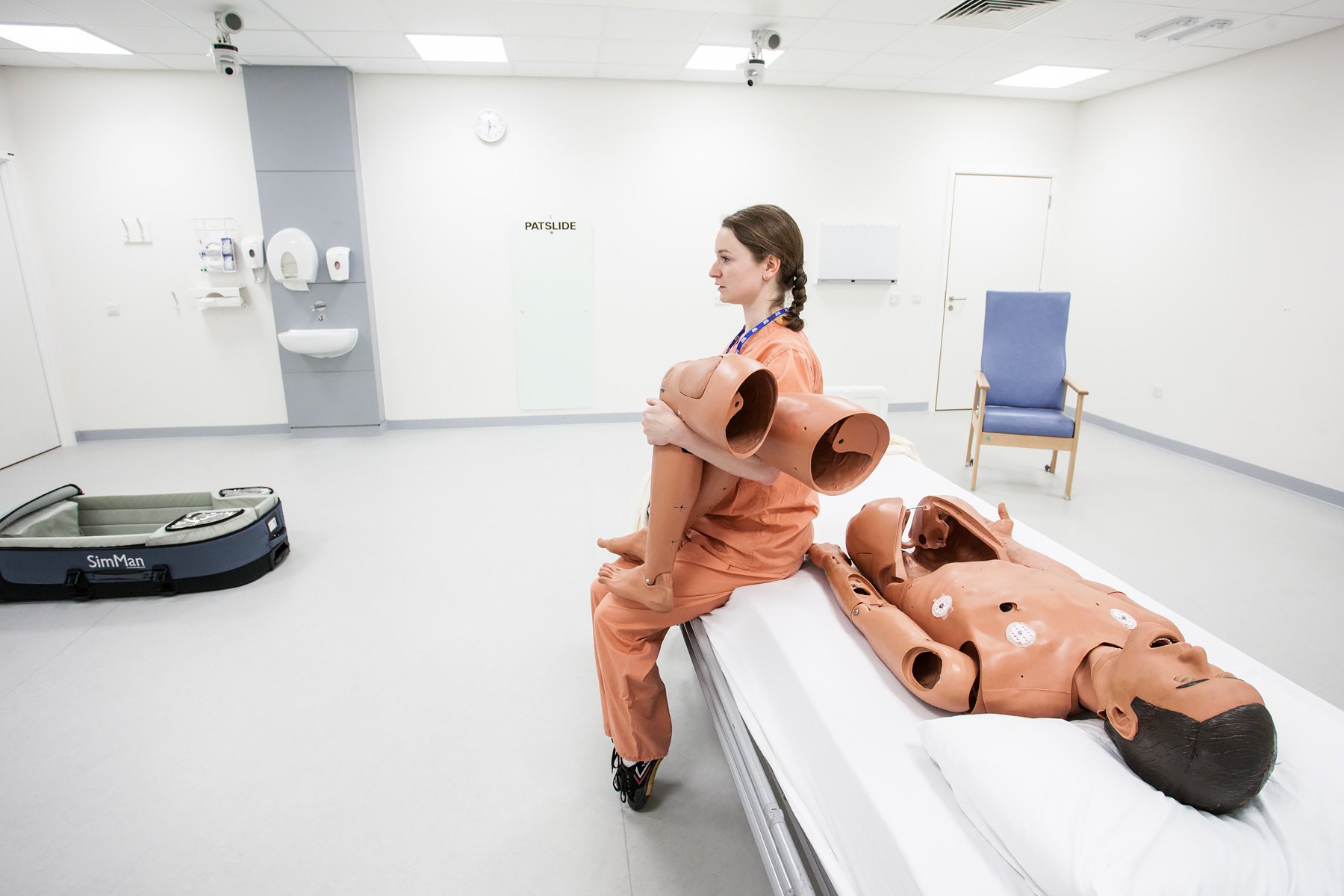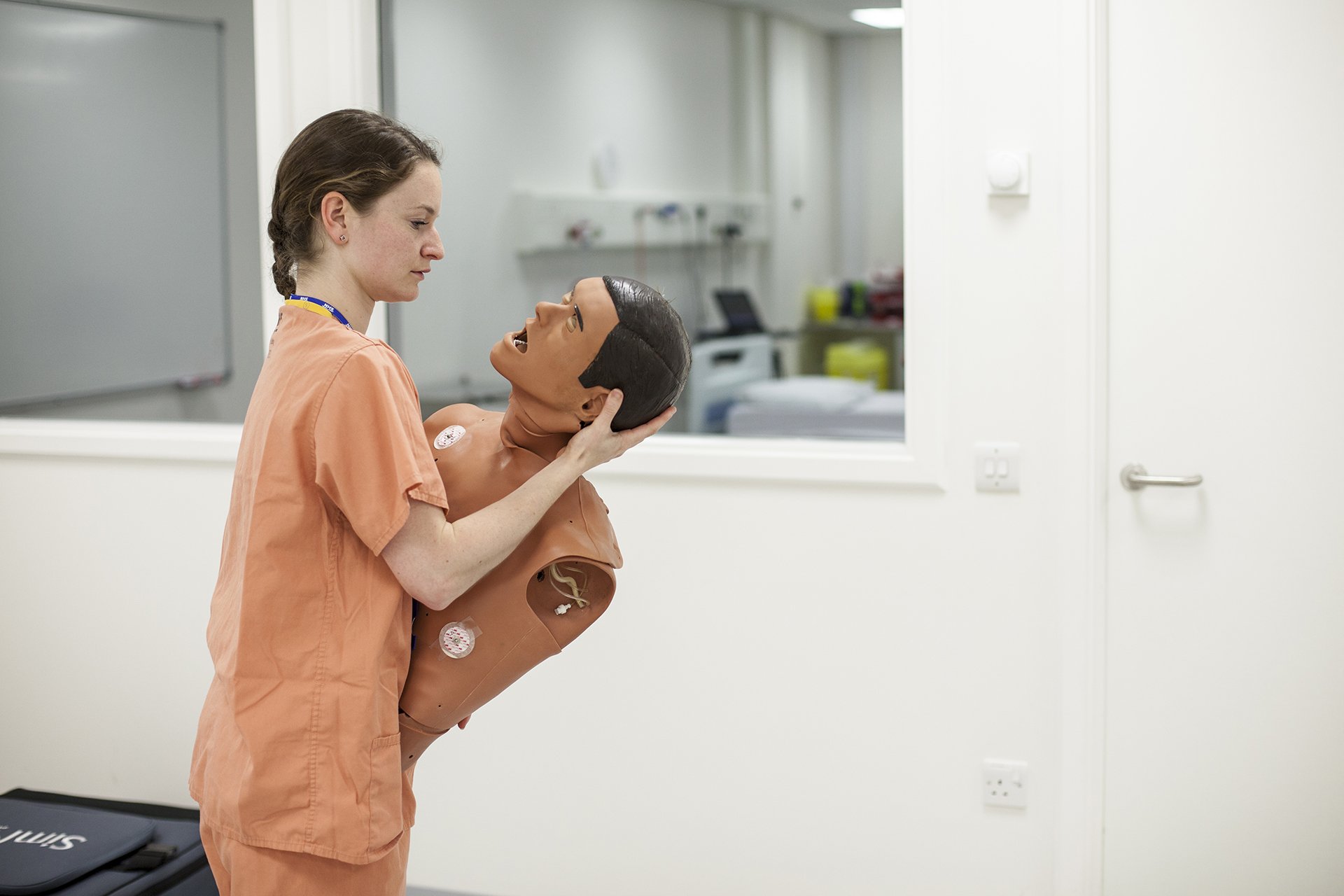
EIDOLON
Eidolon is a live performance developed for the unique setting of medical simulation centres, which mimic clinical hospital spaces such as operating theatres and hospital wards. The project focuses on the high-fidelity manikins used in medical training, teasing out the effect technology has on the body and what it means to be human and alive.
Year: 2013 -2018
Performances: ‘The World Congress on Biomedical Ethics - IAB2016’ Clinical Skills and Assessment Centre, Western General Hospital, Edinburgh (June 2016); ‘Edinburgh Art Festival’ Clinical Skills and Assessment Centre, Western General Hospital, Edinburgh and Edinburgh College of Art (August 2016); ‘Eidolon’ Scottish Centre for Simulation and Clinical Human Factors, Forth Valley Royal Hospital, Larbert (October 2016), 'Professional Clinical Work Based Learning module' for Napier University student Advanced Nurse Practitioners, Clinical Skills Centre, Royal Infirmary Edinburgh (November 2016); ‘Pine’s Eye’, Talbot Rice Gallery, Edinburgh, as part of the opening event for the transimage2018 conference (April 2018); and ‘Different Ways of Seeing’, St Cecilia’s Hall, Edinburgh, as part of the Scottish Medical Humanties Group event (June 2018).
Video documentation: Eidolon - ManiDance vignette (18:00mins)
Links:
Eidolon project development blog (with further video documentation)
https://eidolonblog.wordpress.com/
Eidolon is an interdisciplinary, immersive performance exploring the relationship between the body and technology, and the effect technology has on our perception of what it means to be human and alive. The project was developed at the Scottish Centre for Simulation and Clinical Human Factors (SCSCHF) at the Forth Valley Royal Hospital, Larbert, and was performed within several NHS medical simulation centres around Scotland.
The project brings the general public into a unique setting within the NHS, of the medical simulation centre (which represent clinical hospital locations, such as theatres and wards). Normally only attended by medical professionals, the project opens a window onto a world of high-level technology and patient simulation training. Eidolon explores the emotive and psychological potential of these spaces, in particular the training manikins found within them; technological bodies embodied with physical responses such as voice, pulse, breath and tears. The project embraces and brings to life the challenges the simulation centre presents within their key concern of ‘psychological fidelity’. The performance echoes, and at the same time disrupts, the everyday activities of the simulation centre, to probe the effect that the technological bodies of these training manikins, being physiologically real and responsive, literally physical bodies (yet technological driven), have on our perception of what it means to be human.
The performance consists of a series of vignettes or scenes that are woven together into an immersive promenade where participants are active rather than passive observers. Eidolon brings together professional actors and dancers, medical professionals, simulation technicians, as well as the live audience. Depending on the combination of vignettes being presented, the duration of the piece ranges between 15 minutes to 2 hours.
An installation version of the work was presented at the Edinburgh Art Festival, to accompany the performance programme, and an extract of the work was developed into the virtual reality film ‘Eidolon360’. A paper about the project in-progress was presented at the TaPRA (Theatre and Performing Art) Conference, The Royal Holloway, University of London (2014) and at Consciousness Reframed conference, DeTao University, Shanghai, China, in November (2015), which was subsequently published in Technoetic Arts: A Journal of Speculative Research (2016). A talk about Eidolon was also presented at the Sorbonne, Paris by Dr Michael Moneypenny (SCSCHF) as part of SESAM Paris 2017: The Society in Europe for the Simulation Applied to Medicine (2017). A monograph to accompany the work was published in 2018, with essays by Dr Michael Moneypenny, Beverley Hood, Nicola White and Marina Warner.
Credits: Eidolon was devised in collaboration with Pauline Goldsmith, Stanley Pattison and Magnus Sinding (actors), Freya Jeffs (dancer), and Jeremy Weller (dramaturg).
Funded by: Wellcome Trust Small Arts Award, Creative Scotland, Edinburgh College of Art and the University of Edinburgh. Additional support was provided by NHS Forth Valley and NHS Lothian.
Photography by: Emma Bowen, Alicia Bruce, Beverley Hood, Lindsay Perth and Chris Speed.


















